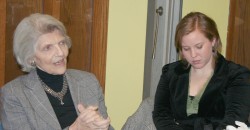 Lauren Derebey, a former Drake Fulbright scholar, listens intently as Harriet Fulbright discusses the need for global involvement over lunch on Drake’s campus. |
World peace promoter Harriet Mayor Fulbright discussed global issues with Drake students over lunch Wed., Jan. 31, in
Fulbright is president of the J. William and
At lunch, Fulbright and Schodde discussed the need for individual cultural awareness and global involvement with former Drake Fulbright scholar Lauren Derebey and global ambassador students Lauren Smith, Sami Auger and Stephanie Sonderegger. Fulbright told the students that citizen diplomacy is a crucial part of
Fulbright also spoke of her late husband, U.S. Sen. J. William Fulbright. “My husband was a man of peace, but he had no illusions that peace was warm and fuzzy — because it’s not,” Fulbright said. The establishment of peace takes hard work and patience, she explained, but it doesn’t have to require fighting. “It’s much better to keep talking than to start fighting,” she said. Sen. Fulbright introduced legislation for the Fulbright Program in 1946, which has since granted scholarships to more than 250,000 individuals around the world.
Fulbright’s lecture, titled “Citizen Diplomacy: An Essential Element of Foreign Policy,” was attended by an enthusiastic and highly engaged group of students and community members. Fulbright’s message reflected on and furthered the points she had pursued at lunch, primarily the importance of Americans’ first-hand interaction with citizens of other countries. She said the need to establish a global community and international understanding is of higher priority even than the advancement of mass communication technology, which she said is only somewhat effective as a community-building tool.
“Recent studies show that the rest of the world knows little about our actual daily lives in
“Relations between countries are too important to be left in the hands of governments,” Fulbright said.
The lecture concluded with an extended question-and-answer session. Fulbright fielded inquiries on her own experiences abroad, the characteristics of a ‘model American’ and the potential of expanding the Fulbright Program into Muslim nations.
The lunch and lecture were funded by Drake’s Center for Global Citizenship and the U.S. Center for Citizen Diplomacy. More information about the centers is available online at www.drake.edu/international/cgc and http://www.uscenterforcitizendiplomacy.org.

